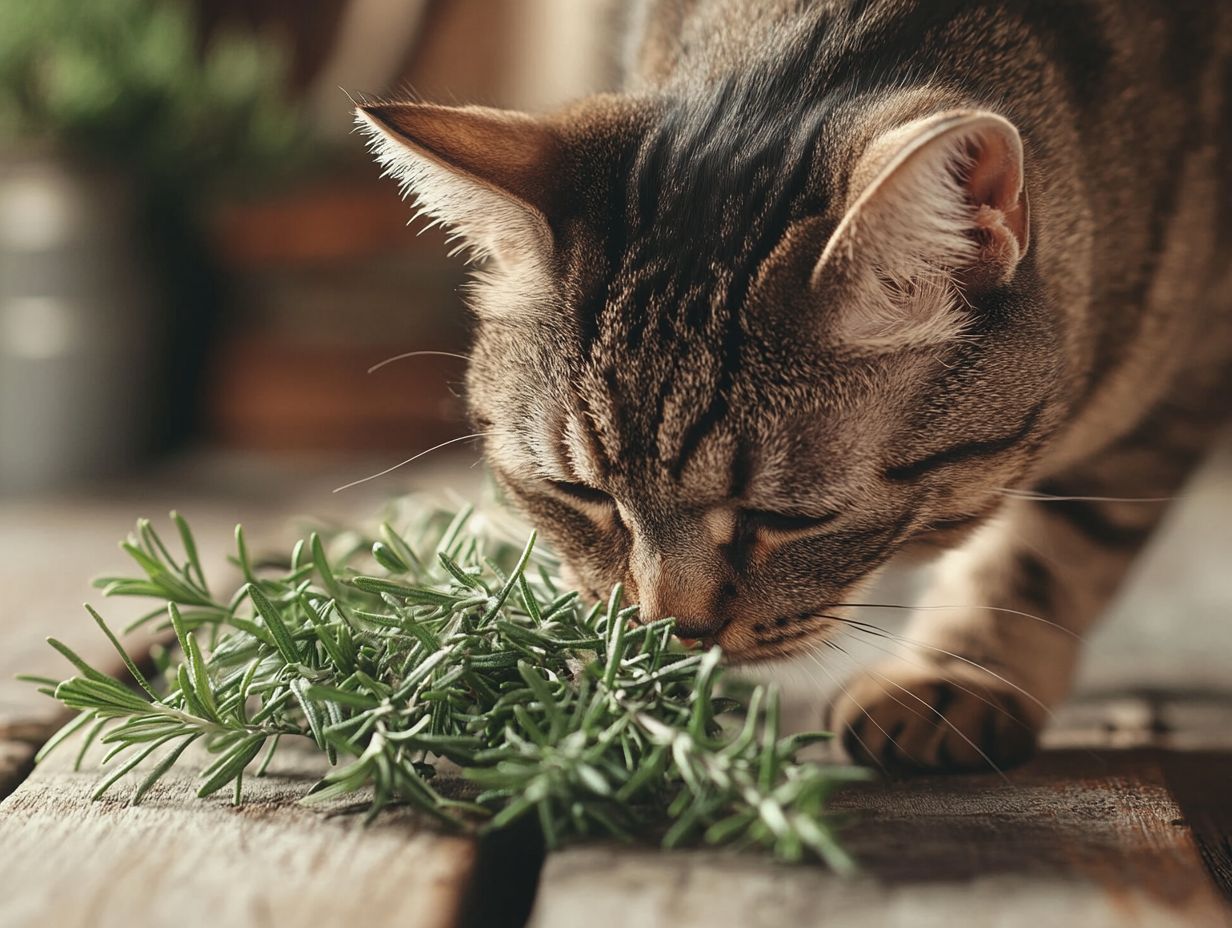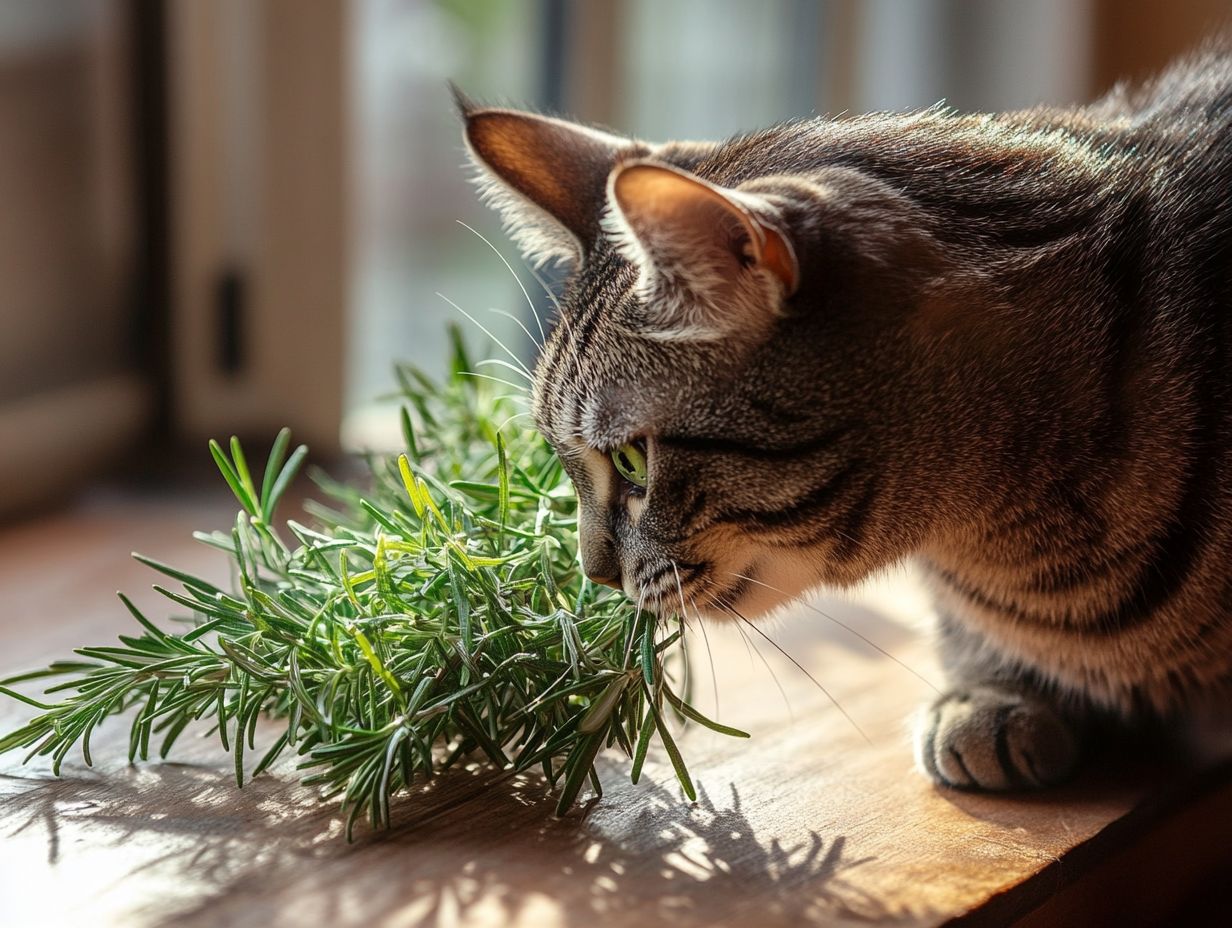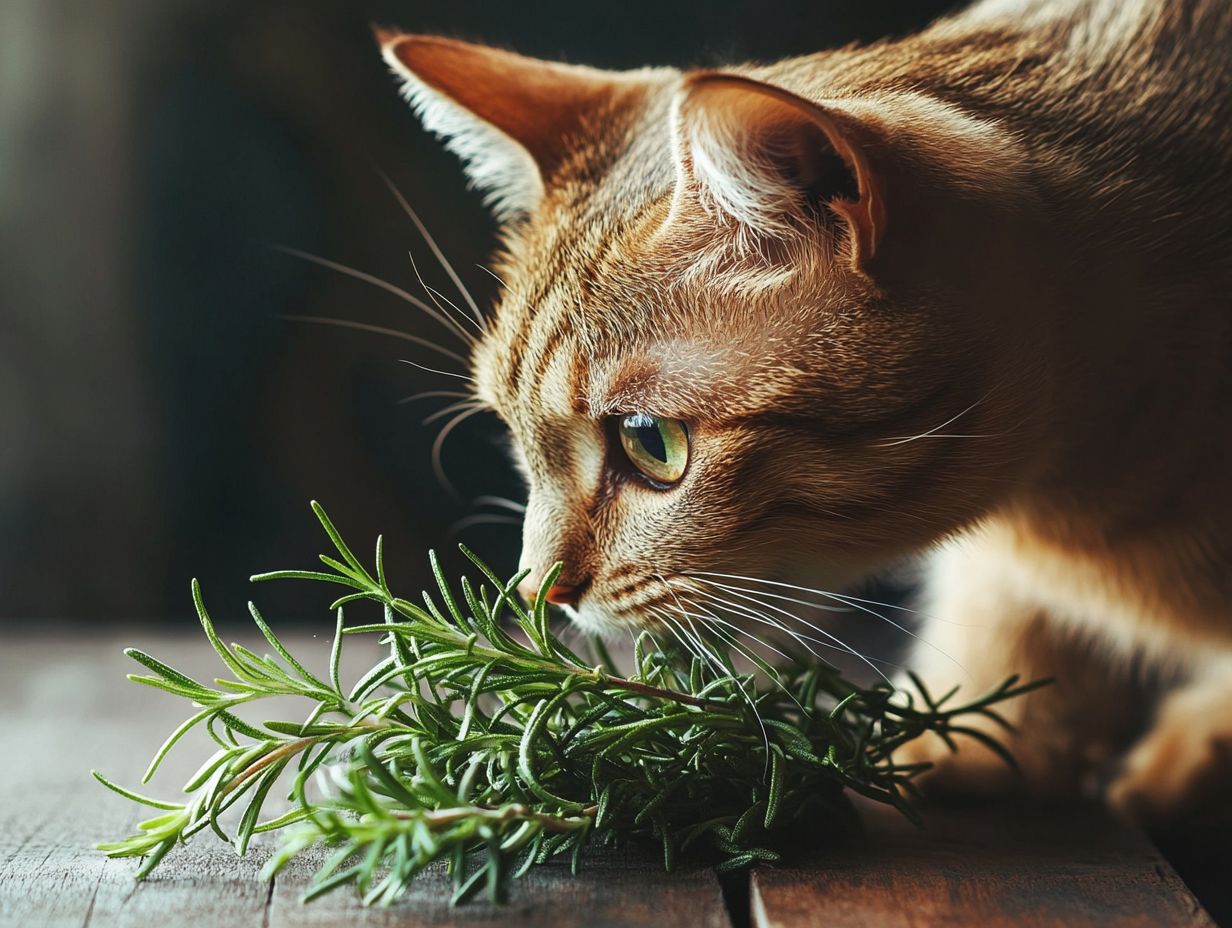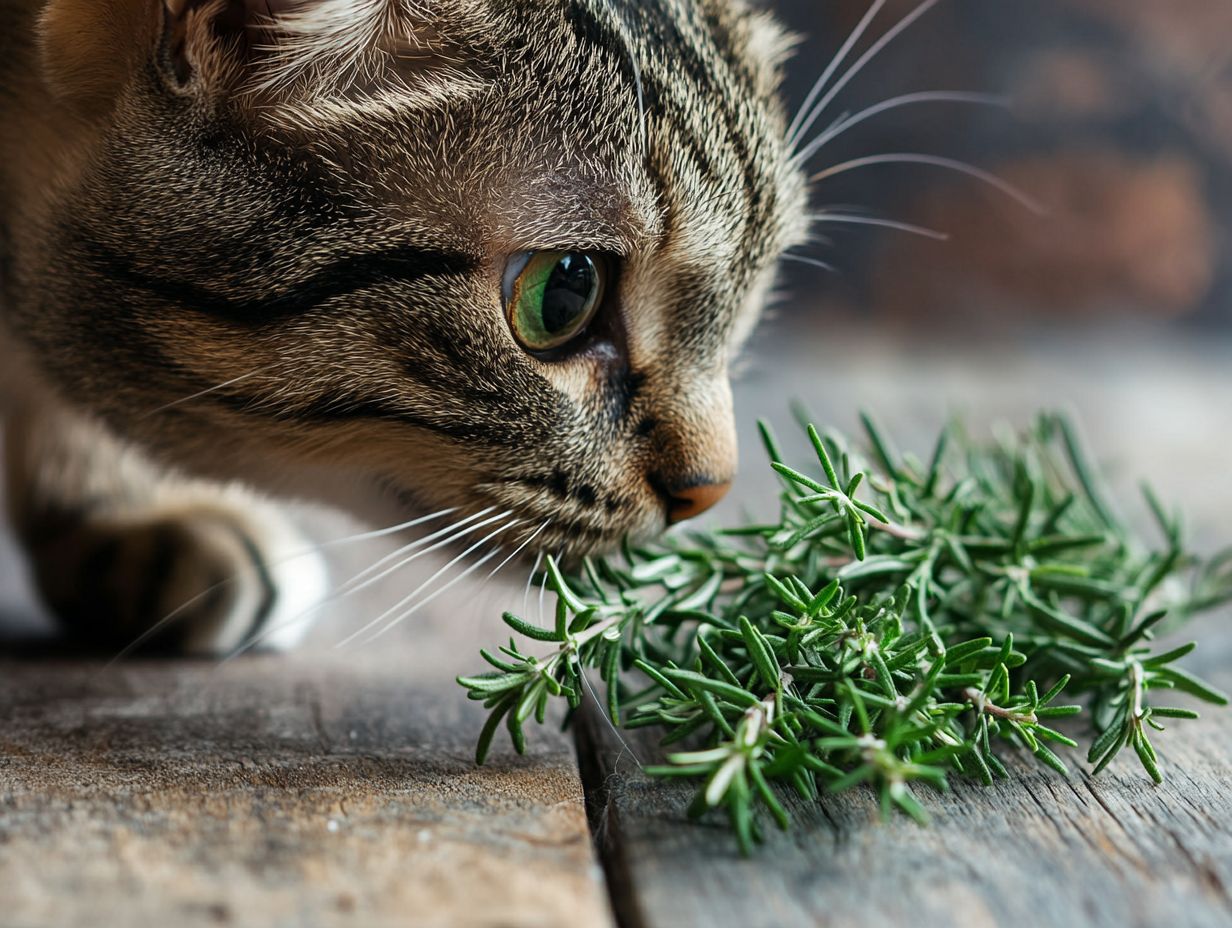Are you curious about the safety of rosemary plants for your feline friend? This article outlines the findings regarding rosemary’s safety for cats, highlighting both the potential benefits and risks associated with this fragrant herb.
We discuss the health benefits rosemary may offer while also addressing potential health concerns. While small amounts are considered safe, eating too much rosemary can upset your cat’s stomach, leading to symptoms like vomiting or diarrhea. To keep your pet healthy, consider safe alternatives such as basil, thyme, and coriander.
Additionally, we provide effective strategies to deter cats from approaching rosemary plants, including using natural deterrents and creating safe spaces in your garden.
Read on to ensure your furry companion stays safe and happy!
Key Takeaways:

- Consult your veterinarian before introducing rosemary to your cat’s diet.
- Limit rosemary to small amounts only; a few leaves or a sprinkle of dried rosemary is generally safe.
- Consider cat-friendly alternatives like catnip or cat grass instead of rosemary.
- Monitor your cat for any adverse reactions after introducing any new herbs.
- Understand that large quantities can lead to digestive upset.
Benefits of Rosemary for Cats
Rosemary is considered non-toxic to cats when consumed in moderation. Some potential health benefits include antioxidant and anti-inflammatory properties. However, always consult with your veterinarian regarding specific dietary needs.
Risks of Rosemary for Cats
While rosemary can be safe, eating too much can upset your cat’s stomach, leading to symptoms like:
- Vomiting
- Diarrhea
- Lethargy
If you notice these symptoms, contact your veterinarian immediately.
Guidelines for Safe Feeding
Here are some tips for safely introducing rosemary to your cat’s diet:
- Start with small amounts—no more than a small pinch for every 5 pounds of body weight—and observe your cat’s reaction.
- Consult your veterinarian before adding new herbs to their diet.
- Limit rosemary to a few leaves or a sprinkle of dried rosemary.
History of Cats and Rosemary Plants
The intertwined history of cats and rosemary plants dates back centuries, with rosemary— a member of the Lamiaceae (mint) family— serving as more than just a common culinary herb. Historically, rosemary has been utilized for medicinal purposes, home care, cooking, and cleaning, as well as being a symbol of remembrance in funerary rites.
Cats have long been cherished pets in households with herb gardens where rosemary flourished alongside other aromatic plants. This relationship has sparked discussions about the potential toxicity of various herbs, including rosemary, concerning feline health.
Understanding the history of cats and rosemary is particularly relevant for today’s pet owners who may wish to cultivate herb gardens while ensuring their pets’ safety from potentially toxic plants. Rosemary is associated with fidelity and remembrance across various cultures and often featured in marriage ceremonies and funerals. Likewise, cats frequently enjoy lounging in fragrant herb beds, highlighting their playful curiosity and natural companionship with aromatic plants.
Experts like Dr. Leslie Sinn, DVM, emphasize that not all plants are safe for pets, advising cat owners to be informed about which plants are suitable. The American Society for the Prevention of Cruelty to Animals (ASPCA) provides a well-known resource on plant toxicity, confirming that rosemary is not harmful to cats in small amounts, although pet owners should remain cautious.
By appreciating the historical connection between cats and rosemary, individuals can create beautiful gardens while prioritizing the health and safety of their furry companions.
The Safety of Rosemary Plants for Cats
Rosemary plants are safe for cats in small amounts, as they are considered non-toxic. However, owners should take necessary precautions to ensure their cats do not have any adverse reactions.
Expert Opinions and Research Findings
Expert opinions from veterinarians and research findings from organizations like the ASPCA indicate that rosemary, when used in moderation, is generally considered safe for cats. However, it is essential for pet owners to stay informed about the specifics of herb consumption in their pets’ diets.
While rosemary is known to offer various health benefits for humans, such as antioxidants and anti-inflammatory effects, its effects on feline health warrant careful consideration. Veterinarians recommend closely observing pets after introducing any new herb, including rosemary, into their diet.
For more information on whether cats can safely interact with rosemary, you can read about it here.
In conclusion, while rosemary can be beneficial in small amounts, it is crucial to approach its introduction to your cat’s diet with caution. Stay informed, consult with your veterinarian, and prioritize your pet’s health and safety.
Rosemary can be safe for cats in small amounts, but eating too much may cause gastrointestinal upset or other severe reactions in sensitive animals. A study published in the Journal of Veterinary Internal Medicine indicates that certain aromatic herbs, when ingested in large quantities, can lead to complications. For more information, check out this article on whether rosemary plants are toxic to cats.
Therefore, responsible pet owners should consult with their veterinarians before adding rosemary as an ingredient or supplement, weighing its potential benefits against any risks it may pose. Understanding each cat’s unique sensitivities is crucial for ensuring their health and well-being.
Potential Risks of Cats Eating Rosemary

While rosemary is generally considered safe for cats, eating too much can lead to potential dangers, resulting in symptoms that may require a visit to the veterinarian.
It’s important to recognize the signs of discomfort in cats after they have eaten rosemary, as some cats may experience digestive upset or other issues due to sensitivities or allergic reactions to the herb.
Common Symptoms and Health Concerns
Health concerns in cats after consuming rosemary may show up through symptoms such as vomiting, diarrhea, and lethargy, indicating a negative reaction. While rosemary is not considered toxic to cats, some may have sensitivities that lead to these adverse effects.
Cat owners should be on the lookout for other signs, such as an upset stomach, excessive drooling, or changes in appetite and behavior. Caregivers must closely monitor their cats after they ingest any herbs.
If symptoms persist for a while or worsen, it is essential to consult a veterinarian to rule out any serious underlying conditions. Additionally, individual cats may respond differently to rosemary and other common herbs; what is safe for one cat may not be safe for another.
Being aware of each cat’s specific reactions can help maintain their health.
Portion Sizes for Rosemary
If you decide to introduce rosemary to your cat’s diet, it’s best to start with no more than a small pinch for every 5 pounds of body weight. Always monitor for any adverse reactions, and if unsure, consult your vet for personalized advice.
Alternatives to Rosemary for Cats
Safe alternatives to rosemary for cats include various non-toxic edible herbs, such as basil, thyme, mint, and chives, that can be incorporated into home cooking. These herbs not only add flavor and nutritional value but are also safe for cats.
Options like basil, thyme, mint, oregano, and chives enhance meal taste while benefiting a pet’s well-being, as they aid in digestion and have antioxidant properties.
Safe and Healthy Options for Cats
The safest and healthiest herbs for cats include basil, thyme, and coriander. Many culinary herbs offer a variety of health benefits and are safe for cats to consume in small amounts, as they do not pose any toxicity risks. These herbs can enhance the flavor of homemade treats and boost a cat’s appetite while providing additional nutrients.
Some of the safest and healthiest herbs for cats are:
- Basil: This herb has antibacterial properties and can be easily mixed into a cat’s food by finely chopping fresh leaves.
- Thyme: Known for its anti-inflammatory benefits, thyme can be sprinkled lightly over treats or used in infusions made from dried leaves.
- Coriander: This herb may aid in digestion and can be added to a cat’s diet fresh or dried, or blended into a paste for easier consumption.
When introducing these herbs to your cat, start with small amounts and monitor for any reactions, gradually increasing the quantity over time.
Preventing Cats from Eating Rosemary

The most effective strategies for deterring cats from approaching rosemary plants involve using solutions that are safe for both cats and the plants themselves.
Techniques like planting aromatic companion herbs, applying natural deterrents, and creating physical barriers can help pet owners protect their cats from the potentially harmful parts of the rosemary plant.
Effective Deterrents and Prevention Strategies
The aim of this article is to protect both rosemary plants and cats. Natural deterrents and preventative measures are the most effective ways to prevent cats from getting too close to rosemary. These methods include using natural repellents, establishing physical barriers, and companion planting with aromatic herbs that deter cats.
For instance, placing citrus peels around pots and using diluted vinegar sprays (1 part vinegar to 3 parts water) are inexpensive and non-harmful solutions that create a safe environment for both cats and plants. Additionally, including companion plants with strong scents, such as lavender, basil, or tarragon, in the garden can enhance its beauty while emitting aromas that are unappealing to cats, thus promoting a harmonious living space.
Benefits of Protecting Rosemary
A wire mesh barrier around the base of the rosemary can serve as a physical deterrent to prevent cat access, enhancing safety for pets. Furthermore, spraying rosemary with a diluted mixture of water and essential oils, such as peppermint or citronella, regularly can reinforce the scent trail that repels curious cats, contributing to a healthy herb garden that remains undisturbed by roaming felines. Consider incorporating perennial herbs such as basil, thyme, and oregano for added culinary flavors.
Risks of Rosemary for Cats
Can Cats Eat Rosemary Plants?
While rosemary is safe for humans, it can be toxic to cats if eaten in large quantities. For more information, consult trusted veterinary sources such as the ASPCA.
What parts of the rosemary plant are toxic to cats?

All parts of the rosemary plant, including the leaves, stems, and flowers, contain compounds that can be harmful to felines if ingested, necessitating precautions in a household with pets.
How does rosemary affect cats?
Rosemary contains essential oils that can cause gastrointestinal upset in cats, leading to symptoms such as vomiting, diarrhea, and stomach pain, affecting their digestive health.
What are the signs of rosemary poisoning in cats?
The signs of rosemary poisoning in cats may include vomiting, diarrhea, loss of appetite, drooling, weakness, and difficulty breathing. Immediate veterinary care is advised if these occur.
Is it safe for cats to be around rosemary plants?
While it is best to keep cats away from rosemary plants to avoid ingestion, simply being around the plant should not cause any harm. Always exercise caution and care.
What should I do if my cat has eaten rosemary plants?
If your cat has ingested any part of a rosemary plant, monitor them closely for any signs of poisoning and contact your veterinarian immediately for further advice. The ASPCA can also be a resource for pet care.
Guidelines for Safe Feeding
When using natural deterrents such as lemon or vinegar sprays, ensure the concentration is mild to avoid overwhelming the plants or the cats. For example, a mixture of 1 part lemon juice to 4 parts water can be effective.
Summary
In summary, while rosemary can provide benefits to cats in small quantities, it is essential to exercise caution. Always consult a veterinarian before introducing any new herb into your pet’s diet, monitor for any adverse reactions, and consider safe alternatives like basil, thyme, and coriander.
For more in-depth information on cat health and safety, consult veterinary sources.